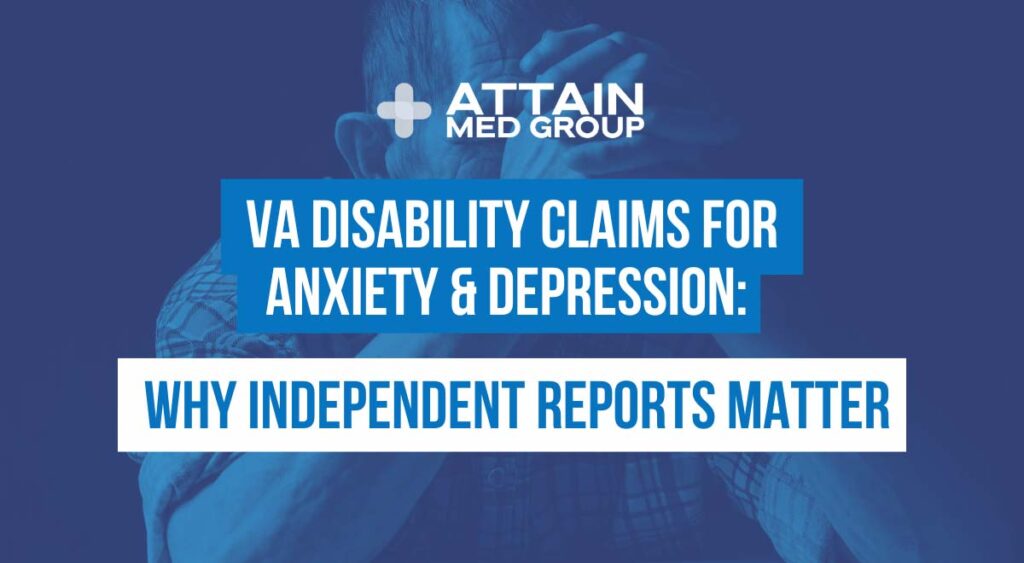VA disability claims for anxiety and depression can be difficult to prove. Many veterans struggle to get the benefits they deserve for these invisible wounds. However, there is a way to strengthen your case: independent medical reports can significantly influence the outcome of these claims.
Anxiety and depression are common mental health conditions affecting veterans, and the VA acknowledges this reality. Proving the existence of these conditions and detailing their impact on daily life, however, is often not straightforward. This is precisely where independent medical reports become valuable tools, offering necessary evidence to substantiate your claim.
Independent reports provide an objective assessment of your mental health condition. They clearly illustrate how anxiety and depression affect your ability to function daily. This detailed information is often pivotal for a successful VA disability claim.
Understanding VA Disability Claims for Mental Health
The Department of Veterans Affairs recognizes various mental health conditions, including anxiety and depression, as potentially disabling. Filing for and receiving benefits for these conditions involves a specific process. Many veterans find this process challenging to handle alone.
Mental health disability claims demand robust supporting evidence. The VA requires clear documentation demonstrating how your condition affects your occupational and social functioning. Critically, the evidence must also establish a connection between your condition and your military service, a point where many claims encounter difficulty.
The VA employs a rating system to determine the severity of disabilities, assigning a percentage based on impairment. For mental health conditions, this rating reflects how significantly the condition impacts your ability to work and maintain social relationships. Achieving an accurate rating reflecting the true severity of your condition can be difficult without strong evidence.

Common Challenges in Mental Health Claims
Veterans often encounter several obstacles when filing disability claims for mental health conditions. A primary issue is often insufficient documentation. Many service members may not seek mental health treatment immediately after service or during service, creating gaps in records needed to prove the condition’s onset and progression.
The fluctuating nature of mental health symptoms presents another challenge. Anxiety and depression can manifest differently from one day to the next. This variability makes it difficult for a single Compensation & Pension (C&P) exam conducted by the VA to capture the full scope and severity of the condition accurately.
Establishing a clear link, or “nexus,” between mental health issues and military service can also be complicated. Unlike some physical injuries directly tied to an event, the connection for conditions like depression or anxiety might develop gradually or stem from various service-related stressors. Proving this service connection requires careful documentation and often expert opinion, especially if symptoms appeared years after discharge.
Service Connection Explained
Service connection is the cornerstone of any VA disability claim. It means proving that your current disability is related to an injury, illness, or event that occurred during your military service. There are several ways to establish service connection for mental health conditions.
Direct service connection is the most common type. This applies when evidence shows your anxiety or depression began during service or was directly caused by an event in service (like combat exposure or military sexual trauma). Medical records from service showing treatment or diagnosis are strong evidence here.
Secondary service connection occurs when a service-connected physical condition causes or aggravates a mental health condition. For example, chronic pain from a service-connected back injury might lead to depression. In this case, you need evidence linking the depression to the already service-connected back pain.
Service connection through aggravation means a condition existed before service but was made permanently worse by military service. Evidence must show the baseline level of the condition before service and how service activities increased its severity beyond natural progression. Sometimes, attempting to upload large files documenting this history can lead to system errors, perhaps showing a message like uid rate limit exceeded, requiring persistence or alternative submission methods.
The Role of Independent Reports
Independent medical reports can effectively address many challenges inherent in VA mental health claims. These reports offer a detailed, objective perspective on your condition provided by medical or psychological professionals operating outside the VA system. This external viewpoint adds significant credibility.
Such reports typically involve comprehensive evaluations of your symptoms and functional impairments. The examination process for an independent report is often much longer and more in-depth than a standard VA C&P exam. This allows the independent examiner to develop a more complete and nuanced understanding of your condition and its pervasive effects on your life.
Independent experts are also skilled at establishing service connection. They meticulously review your complete medical and service history, often identifying crucial links between your military experience and your current mental health status that may have been previously overlooked. Their analysis can bridge gaps in your records.

C&P Exams vs. Independent Medical Opinions (IMOs)
It’s helpful to understand the difference between VA-ordered C&P exams and independent medical opinions (IMOs) or reports. C&P exams are requested by the VA to evaluate your claimed condition. The examiner works for the VA or a contractor and provides an opinion directly to the VA.
While C&P examiners are supposed to be objective, veterans sometimes feel these exams are rushed or don’t fully capture their disability. The primary purpose is for the VA to gather information for rating purposes. Some veterans report feeling like just another number during these exams.
Independent reports, on the other hand, are obtained by the veteran outside the VA system. You choose the provider, who performs an evaluation specifically to document your condition thoroughly for your claim. These reports serve as evidence submitted by you to support your case, offering a counterpoint or supplement to the C&P exam findings.
Here’s a quick comparison:
| Feature | VA C&P Exam | Independent Medical Report (IMO) |
| Requested By | VA | Veteran |
| Examiner Relationship | Works for/contracted by VA | Chosen by Veteran, works for Veteran |
| Primary Purpose | Provide opinion to VA for rating | Provide detailed evidence for Veteran’s claim |
| Depth of Exam | Often brief, focused on specific VA questions | Typically thorough, comprehensive review of history and symptoms |
| Submitted By | Examiner submits directly to VA | Veteran submits report to VA as evidence |
This table highlights the different roles these examinations play in the claims process.
Types of Independent Reports
Several kinds of independent reports can bolster your VA disability claim for anxiety or depression. Each type addresses specific aspects of the claim. Knowing the differences helps you seek the most relevant evaluation for your circumstances.
Independent Psychological Evaluations (IPEs) offer a comprehensive assessment of your mental health status. These evaluations delve deeply into your symptoms, history, and functional limitations using standardized tests, clinical interviews, and record reviews. An IPE provides a detailed portrait of your condition and how it impacts your work, social interactions, and daily activities.
Nexus letters are focused documents written by qualified medical professionals. Their specific purpose is to establish a connection (nexus) between your current mental health condition and events or circumstances during your military service. A well-reasoned nexus letter, based on a review of your records and possibly an examination, is powerful evidence for proving service connection, especially if the link isn’t immediately obvious.
Vocational assessments evaluate how your anxiety or depression affects your ability to obtain and maintain substantially gainful employment. A vocational expert analyzes your work history, education, skills, and the limitations imposed by your mental health condition. This type of report is particularly important for claims involving Total Disability based on Individual Unemployability (TDIU), as it directly addresses your capacity to work.
Benefits of Independent Reports in VA Claims
Utilizing independent reports in your VA claim process provides several distinct advantages. They often present crucial evidence that standard VA examinations might overlook or underemphasize. This supplementary evidence can lead to more accurate disability ratings and ultimately better outcomes for veterans.
A significant benefit lies in the exceptional level of detail found in independent reports. Professionals conducting these evaluations typically invest more time to explore the nuances of your condition and its daily impact. This thoroughness helps the VA understand the full severity and scope of your anxiety and depression.
Furthermore, independent reports serve as valuable tools if you need to contest the findings of an inadequate VA C&P exam. If you believe a VA examiner did not accurately assess your condition, submitting a detailed independent report offers a credible second opinion from a qualified professional. This can be compelling evidence, especially during the appeals process.
Strengthening Your Claim with Independent Reports
Independent medical reports can substantially fortify your VA disability claim. They deliver objective, professional assessments of your condition and its service connection. Such expert opinions carry considerable weight with VA rating officials and decision-makers.
These reports are particularly useful for filling evidentiary gaps in your medical history. If you delayed seeking treatment after service, an independent evaluation conducted later can still document the presence and severity of your symptoms. It can provide a medical opinion tracing the likely onset and progression back to your service period.
Independent reports also contribute significantly to narrating your personal story within the formal structure of a VA claim. They place your symptoms within the context of your life experiences and functional abilities. This helps the VA comprehend the real-world consequences of your mental health condition on your daily routines and employment capacity.
How to Obtain Independent Reports
Securing independent medical reports involves initiative, but the potential benefits make the effort worthwhile. The initial step is identifying a suitable professional, preferably one experienced with VA disability evaluations. They must understand the specific criteria and documentation the VA requires for mental health claims.
Various veterans’ service organizations (VSOs), veteran advocacy groups, or attorneys specializing in VA law can often provide referrals to qualified psychologists, psychiatrists, or vocational experts. Some organizations might offer financial assistance or connect veterans with pro bono services. Exploring these resources can ease the process and potentially the cost; reaching out is a good starting point.
During your appointment with the independent professional, openness and honesty are vital. Provide comprehensive information about your condition, symptoms, treatment history, service experiences, and how your mental health impacts your life. The more thorough the information you provide, the more detailed and impactful their resulting report will be.
Working with Attain Med Group
Attain Med Group focuses on providing independent reports tailored for VA disability claims. They possess a deep understanding of the specific needs of veterans dealing with conditions like anxiety and depression. Their reports are structured to align with VA evidentiary standards and effectively strengthen veterans’ claims.
The professionals at Attain Med Group adopt a careful, individualized approach. They invest the necessary time to fully understand each veteran’s unique background and circumstances. This commitment allows them to produce comprehensive, persuasive reports.
Attain Med Group provides a range of relevant evaluation services. They offer Independent Psychological Evaluations (IPEs), nexus letter preparation, and vocational assessments. Their stated mission is to equip veterans with the strong medical evidence needed to pursue a fair and accurate disability rating. Accessing their services might involve coordinating appointment times, potentially across different time zones, possibly referencing coordinated universal time for clarity.

Using Independent Reports in Your Claim
After obtaining your independent report, proper utilization is key. Submit the report to the VA promptly. Ensure it becomes an official part of your claim file by uploading it through the VA website or mailing it with tracking, confirming receipt is crucial, as sometimes online portals might experience technical issues or rate limit problems.
When communicating with the VA about your claim, reference the key findings of the independent report. If a VSO representative or attorney assists you, review the report together. They can help strategize how to best highlight the most critical information for the VA raters.
Should you need to appeal an unfavorable VA decision, the independent report often forms the backbone of your new evidence. It provides a strong basis to argue why the initial VA assessment or decision was flawed. Use the report’s findings to clearly demonstrate your entitlement to the benefits sought or a higher disability rating.
The Impact of Independent Reports on Claim Outcomes
Independent medical reports can substantially influence the final outcome of VA disability claims. Numerous veterans have experienced positive shifts in their claim status or disability ratings after submitting such reports. In many instances, these reports provide the pivotal evidence needed to turn a denial into an approval.
These detailed reports frequently contribute to more accurate disability ratings. By offering a clearer, more comprehensive depiction of how anxiety and depression impair a veteran’s functioning, they help VA raters assign percentages that truly reflect the condition’s severity. This often translates into higher ratings and increased monthly compensation and benefits.
Moreover, independent reports have proven instrumental in winning appeals. They supply the objective medical evidence required to successfully challenge and overturn initial VA decisions deemed incorrect or based on insufficient C&P exams. This underscores the significant value these reports bring to the often lengthy and sometimes frustrating VA claims adjudication process; overcoming a system error like rate limit exceeded during evidence submission is a minor hurdle compared to overturning a denial without strong evidence.
Conclusion
Navigating VA disability claims for anxiety and depression presents unique hurdles. However, independent medical reports serve as powerful allies in this process. They offer detailed, objective medical evidence concerning your condition and its connection to service, which can be vital for achieving the benefits you rightfully earned.
Independent reports matter profoundly because they help convey the full story of your condition. They meticulously document how anxiety and depression genuinely impact your daily life and ability to function. Crucially, they can establish the necessary link to your military service and effectively counter potentially inadequate VA examination findings.
If you are facing difficulties with a VA claim for anxiety or depression, seriously consider obtaining an independent medical report. This step could provide the critical evidence needed for a successful outcome and prevent issues like hitting a uid rate or uid rate limit cap on VA system interactions due to incomplete initial submissions. Remember, support is available; organizations like Attain Med Group specialize in assisting veterans with this specific need, ensuring your evidence meets VA standards and gives you the best chance for fair recognition and support.

